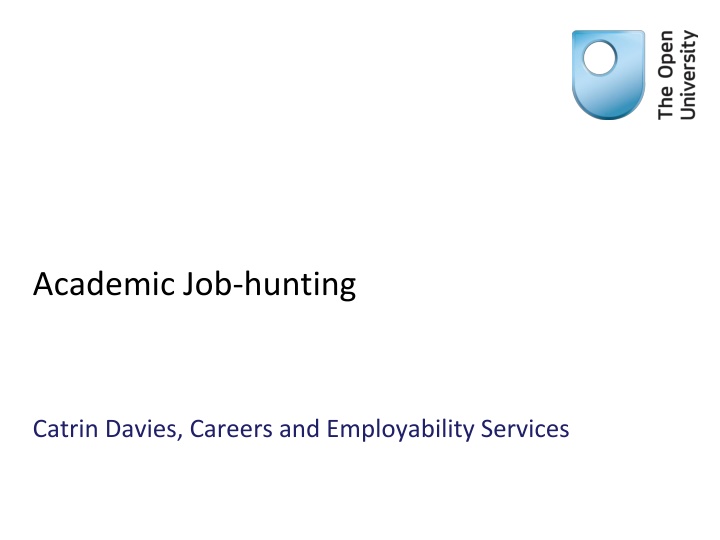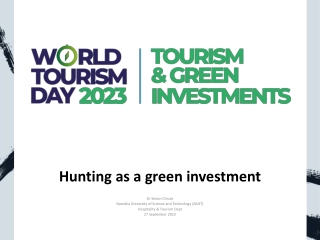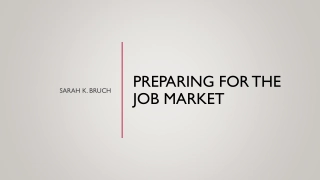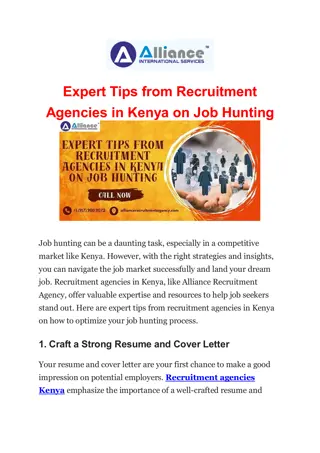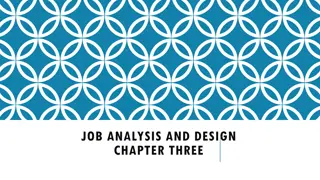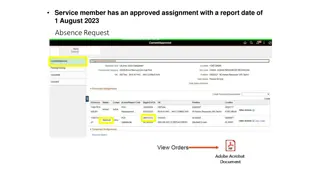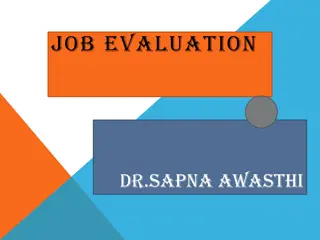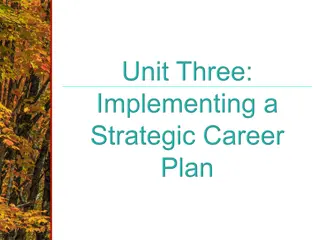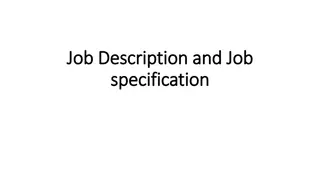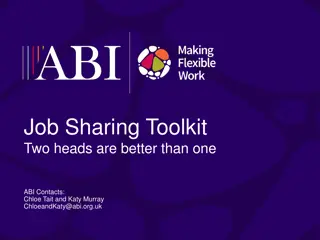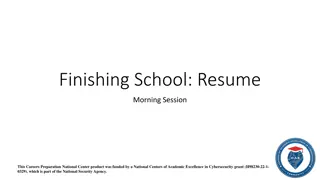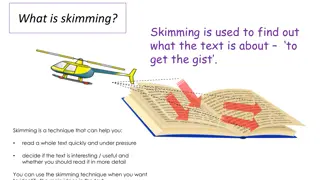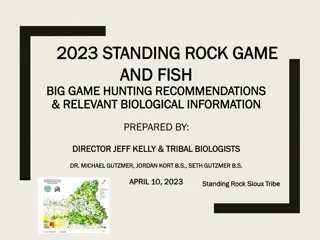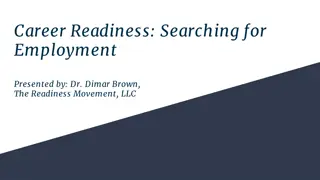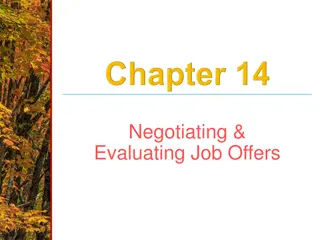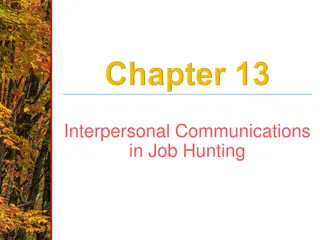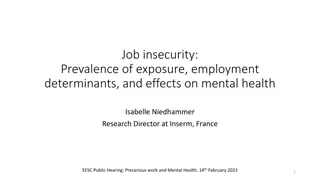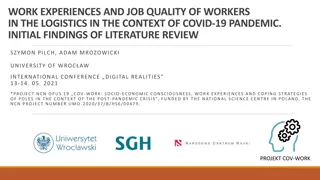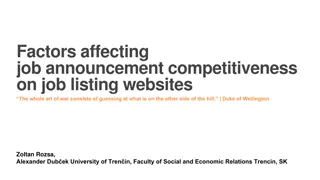Academic Job-hunting
Engage in a workshop to enhance your understanding of the academic labor market, develop career strategies, identify support sources, and plan actions. Explore the challenges, opportunities, and evolving landscape of academia to make informed decisions and advance your career. Discover what academic employers seek and how to demonstrate your value to departments through effective communication, teaching abilities, and research expertise.
Download Presentation

Please find below an Image/Link to download the presentation.
The content on the website is provided AS IS for your information and personal use only. It may not be sold, licensed, or shared on other websites without obtaining consent from the author.If you encounter any issues during the download, it is possible that the publisher has removed the file from their server.
You are allowed to download the files provided on this website for personal or commercial use, subject to the condition that they are used lawfully. All files are the property of their respective owners.
The content on the website is provided AS IS for your information and personal use only. It may not be sold, licensed, or shared on other websites without obtaining consent from the author.
E N D
Presentation Transcript
Academic Job-hunting Catrin Davies, Careers and Employability Services
Learning outcomes At the end of this workshop participants will be able to: Understand current academic labour market and skills Develop strategies for continuing a career in academia Identify sources of support Plan for action And you? What do you want to get out of it? Think of some concrete questions, we ll come back to them later 2
Quiz 100,000 71% of Early Career Researchers on permanent contract have while 25% have . British Academy (2014) % working in higher education 3.5 years after graduation? Applications per post to University of Warwick postdoctoral research fellowships 2012/13? What do researchers do? Vitae (2013)
How far is academia an informed decision for you? a teacher, a writer, a politician, a performer, a mediator and, sometimes, even a therapist Andrew Hollenbach Which are the aspects that appeal? How informed is your choice? Labour market research? Conversations with others 3, 5, 15 years ahead of you? Begin with end in mind. Which elements are weighted highly in selection? How is the sector changing? What can you do to get ahead of the curve?
Successful jobhunting Their needs Your evidence & credibility on how you meet the needs
Activity: What do academic employers want? Looking at job adverts from different institutions 10 mins and discussing on your table Ignore the discipline content Consider the different flavours in different institutions How have you and others you ve seen developed relevant experience? 6
How would you add value in this department? Publications Confidence to defend your work effectively How effectively can you communicate your work to a range of audiences? Evidence of ability to teach, develop curriculum, assess, think about effective teaching with different needs Develop ability to write successful research bids Take department in interesting, productive new directions (likeability)
Candidates who ..have reflected deeply on their teaching experience, evidenced with convincing teaching materials, thoughtful persuasive applications & detailed, thoughtful performance at interview . It sounds obvious, but the best candidates address the essential requirements of the job spec in their covering letter, mirroring the criteria Make sure you know what the teaching/research of the department is about & can articulate how your experience can further that I am drawn to candidates who draw on their previous professional experiences & relate them to the position in question (not just their previous position only) I love someone who demonstrates a bit of humility and doesn t set out to change the world but starts off saying they need to listen to learn more ! Key to understand departmental ethos/implications for your application. For us.. vocationally relevant curriculum we want experienced practitioner with good research profile.. Where I externally examine they only seek research record.
Successful academic jobhunters say Be clear on your priorities. I agonised and turned down a job with high teaching load on topics which weren t my key interests because I could see it would distract from writing up and publishing. When it wasn t going well I tried to focus on what I was learning rather than the outcomes I switched from being social worker, to retraining & working as primary teacher, to stay at home mum of three for ten years, to doctoral researcher, to changing my research field I was 46 when I got my doctorate. But I made a critical choice to join up the dots in my research, was strategic in my choices, so it wasn t completely starting at the bottom. (Now Professor) I researched their focuses, research, research centres and groups, interdisciplinary collaboration, new degrees they might be thinking of so I could explain how my work could fit and enhance.
Is my network fit for purpose? How far does my network include people who can inform my skills gaps? Or does it reflect those I ve known in the past? How confident do I feel asking for support where I feel less secure? How can I strengthen relationships in these fields? International?
Pre-application research Research discussion topics by all other means first (e.g. web listings of previous grants, profiles of current staff, linkedin, your contacts) Be focussed Plans for new taught courses Future plans for funding Line management and mentoring arrangements Provision of specialist facilities required for job Intellectual property matters
Statement of academic research interest A proposal for future academic research How it builds on current expertise and achievements Tailor to interests/expertise in host department Tailor your previous experience to proposed project as far as possible: structure by project aims, achievements, relevant techniques, your responsibilities I researched their focuses, research, research centres and groups, interdisciplinary collaboration, new degrees they might be thinking of so I could explain how my work could fit and enhance.
Speed advising 5 min Your anonymous question on a piece of paper Comfortable ways for me to build a professional network as an introvert? Circulate and add thoughts & suggestions to those of others 1 min per piece - 5 in 5 mins Move on to the next one
Academic CVs see vitae.ac.uk/researcher-careers Think deeply then communicate with clarity tailor Academic achievements & research interests Publications reverse chronological Research experience include specialist/technical expertise, IT skills, relevant skills incl project/people management Education (focus on HE). Include awards, name of doctoral supervisor, funding body if relevant Funding awarded. Include grants to attend conferences. Teaching experience from lecturing, supervision to curriculum development & marking Administrative experience/positions of responsibility Outreach / media engagement /impact
Academic interviews http://www.academiccareer.manchester.ac.uk/interviews/academicquestionbank/ What ideas do you have for future research and what are the potential funding sources? What teaching skills have you developed in the last year? What can you do to encourage student participation in seminars? Have you convened a team-taught module? What challenges would there be? How would you handle these? How do you conceive of the relationship between research and teaching? How would you change the teaching of X?
Competency questions: the STAR model Situation (half sentence: As Student Rep on the departmental committee ) Task (what you personally were responsible for) I was responsible for . Action - I did this by a, b, c; or I needed to consider x, y, z Result - outcome, results, learning (quantifiable, feedback, what I learned) Which examples for which skills on the person specification? How do they fit into star? Practise.
Key resources www.vitae.ac.uk www.academiccareer.manchester.ac.uk www.beyondthephd.co.uk www.chase.ac.uk (Consortium of Humanities in SE England) www.findapostdoc.com www.jobs.ac.uk www.prospects.ac.uk @EarlyCareerBlog @researchwhisperer @vitae_news Vitae Researcher Development Framework Lynda Ali & Barbara Graham, Moving on in Your Career: A Guide for Academics and Postgraduates, Routledge, 2000 Support for Arts and Humanities researchers post-PhD, British Academy AHRC, 2014 www.open.ac.uk/wikis/IET-Intranet/Research_Career_Development_Team www.open.ac.uk/careers
Your action points? What do you commit to yourself to do? By when? Write it in your diary now! Whose contact details here do you want to get?
